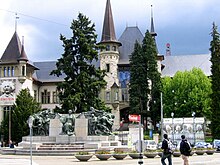Bern Historical Museum
| German: Bernisches Historisches Museum French: Musée d’Histoire de Berne |
|

The Museum entrance on Helvetiaplatz
|
|
| Established | 1894 |
|---|---|
| Location | Helvetiaplatz, Bern, Switzerland |
| Coordinates | 46°56′35″N 7°26′57″E / 46.94306°N 7.44917°ECoordinates: 46°56′35″N 7°26′57″E / 46.94306°N 7.44917°E |
| Type | History |
| Collection size | 500,000 |
| Director | Jakob Messerli |
| Architect | André Lambert |
| Website | www |
The Bern Historical Museum (Bernisches Historisches Museum, Musée d’Histoire de Berne ) is the second largest historical museum in Switzerland. It was designed by the Neuchâtel architect André Lambert and built in 1894. Since it was initially conceived as the Swiss National Museum (which the city of Zurich was later chosen to host), the architect took as his model various historic castles from the 15th and 16th centuries. An extension to the original museum building was completed in 2009.
The museum contains collections related to the history of Bern from prehistoric times to the present and other artifacts on permanent display from Asia, Oceania, America and Egypt. It is a heritage site of national significance.
First conceived as a temporary exhibition in 2005, the Einstein Museum became a museum dedicated to the life and work of Albert Einstein, who developed the Relativity Theory while living in Bern. The house where he lived (Einsteinhaus) in this period is also open to the public, but is located elsewhere in the city and charges separate entry fees.
...
Wikipedia



